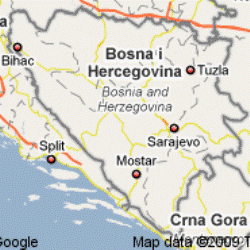We welcome, that visa-free travel should be granted to citizens of Montenegro, Macedonia and Serbia as of 1 January 2010. Equal rights will, for example, be refused to Bosnia and Herzegovina. The European Commission ignores that Bosnia and Herzegovina and Serbia are almost at the same level with regard to the introduction of bio-metric passports and a variety of legislative acts agreed on the visa liberalisation road map. The arguments which serve to justify the Commission recommendation are factually unconvincing and politically irresponsible.
The draft recommendation on visa liberalisation will increase tensions within the fragile post-war societies as the plans of the Commission will formalise ethnic divisions and provide them with dubious legitimacy. Only a part of the citizens of Bosnia and Herzegovina will profit from the new travel regime. Bosnian Serbs and Serbs from Kosovo travel visa free in the EU thanks to their second passport issued by the Republic of Serbia as of 1 January 2010. Bosnian Croats have already enjoyed visa-free travel to the EU for a couple of years thanks to their Croatian passports. Restrictions thus remain in place for the Bosniak people of Bosnia and Herzegovina. De facto, ethnic criteria will decide on whether a citizen is able to travel freely to the EU.
These days, 14 years ago, more than 8,000 Muslim boys and men were killed around Srebrenica. It is evidence of the EU’s poor political judgement that Bosniak survivors and relatives of the killed will be disadvantaged in comparison to the hundreds of suspected perpetrators who committed crimes in Srebrenica and who continue to evade justice.
German post-war history reminds us how important the freedom to travel has been for the peaceful development of a society. With the change of the travel laws in the GDR on 9 November 1989 the wall came down. The East and the West of Europe were able reunite. People in South Eastern Europe have the same right to freedom of travel. A region still haunted by nationalism needs freedom of exchange of ideas and opinions and also the right to travel. It is not freedom that creates instability, but the suppression of freedom.
The guiding vision of the visa liberalisation policy of the European Union is to bring South Eastern Europe closer to the EU and to promote European reconciliation and cooperation. In the next weeks, the European Commission, the European Council and the European Parliament have the choice between a visa policy that is uniting Europe or one that separates people on the basis of their ethnicity.
We ask you for your support and signature by sending an e-mail to southeastern.europe@gmx.de ! Please support this civil society initiative by distributing this message.





